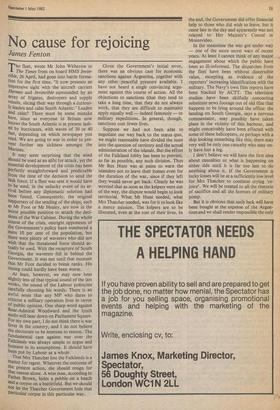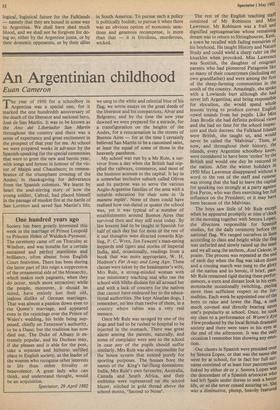No cause for rejoicing
James Fenton
The fleet, wrote Mr John Witherow to The Times from on board HMS Invin- cible, 26 April, had gone into battle forma- tion for the first time. 'It now presents an impressive sight with the aircraft carriers Hermes and Invincible surrounded by an array of frigates, destroyers and supply vessels, slicing their way through a curious- ly leaden and calm South Atlantic.' Leaden and calm? There must be some mistake here, since as everyone in Britain now knows the South Atlantic is at present lash- ed by hurricanes, with waves of 30 or 40 feet, depending on which newspaper you read. We are going to war in order to pre- vent further sea sickness amongst the Marines.
It may seem surprising that the wind should be used as an alibi for attack, yet the essential development of the crisis has been Perfectly straightforward and predictable from the time of the decision to send the task force. If a fleet was sent it would have to be used, in the unlucky event of its ar- rival before any diplomatic solution had been found. Consequently, the original supporters of the sending of the ships, such as Mr Foot or Mr Healey, are now in the worst possible position to attack the deci- sions of the War Cabinet. During the whole course of the crisis, outright opponents of the Government's policy have numbered a mere 10 per cent of the population, but there were plenty of waverers who did not wish that the threatened force should ac- tually be used. With the recapture of South Georgia, the waverers fell in behind the Government. It was not until that moment that Mr Foot decided to break ranks. His tuning could hardly have been worse.
At least, however, we may now hear slightly less of that typical sound of the last weeks, the sound of the Labour politician carefully choosing his words. There is an awful sense that any MP who dares to criticise a military operation lives in terror of public opinion. One sharp word against Rear-Admiral Woodward and the lynch mobs will bear down on Parliament Square. For my own part, I do not think there is war fever in the country, and I do not believe the electorate to be immune to reason. The fundamental case against war over the Falklands was always simple to argue and humane in its assumptions. It should have been put by Labour as a whole. That Mrs Thatcher lost the Falklands is a matter for regret. Whatever the outcome of the present action, she should resign for that reason alone. A wise man, according to Father Brown, hides a pebble on a beach and a corpse on a battlefield. But we should not let the Thatcher Government hide that Particular corpse in this particular way. Given the Government's initial error, there was an obvious case for economic sanctions against Argentina, together with any other peaceful pressure available. I have not heard a single convincing argu- ment against this course of action. All the objections to sanctions (that they tend to take a long time, that they do not always work, that they are difficult to maintain) apply equally well — indeed famously — to military expeditions. In general, though, sanctions cost fewer lives.
Suppose we had not been able to negotiate our way back to the status quo, we might reasonable have divided the issue into the question of territory and the actual administration of the islands. But the effort of the Falkland lobby has been to prevent, as far as possible, any such division. Thus Mr Rex Hunt was at pains to warn the islanders not to leave their homes even for the duration of the war, since if they left they would never get back. Clearly he was worried that as soon as the kelpers were out of the way, the dispute would begin to look territorial. What Mr Hunt needed, what Mrs Thatcher needed, was for it to look like a mercy mission. The kelpers are to be liberated, even at the cost of their lives. In the end, the Government did offer financial help to those who did wish to leave, but it came late in the day and apparently was not relayed to Her Majesty's Consul in Montevideo.
In the meantime the war got under way — one of the more secret wars of recent years. At least I cannot think of any major engagement about which the public have been so ill-informed. The dispatches from the fleet have been without discernible value, excepting as evidence of the reporters' increasing identification with the military. The Navy's own film reports have been blacked by ACTT. The television studios have been skilfully concocting substitute news footage out of old film that happens to be lying around the office: the landing on South Georgia, says a nervous commentator, may possibly have taken place in the vicinity of this harbour, and might conceivably have been effected with some of these helicopters, or perhaps with a ship looking something like this; there may very well be only one casualty who may on- ly have lost a leg.
I don't believe we will have the first idea about casualties or what is happening on either side until it is far too late to do anything about it. If the Government is lucky losses will be at a sufficiently low level for Mrs Thatcher to continue crying 're- joice'. We will be treated to all the rhetoric of sacrifice and all the horrors of military pomp.
But it is obvious that such luck will have been bought at the expense of the Argen- tines and we shall render impossible the only logical, logistical future for the Falklands — namely that they are bound in some way to Argentina. We shall have shed much blood, and we shall not be forgiven for do- ing so, either by the Argentine junta, or by their domestic opponents, or by their allies in South America. To pursue such a policy is politically foolish; to pursue it when there was an obvious option of economic sane- dons and generous recompense, is more than that — it is frivolous, murderous, wicked.







































 Previous page
Previous page